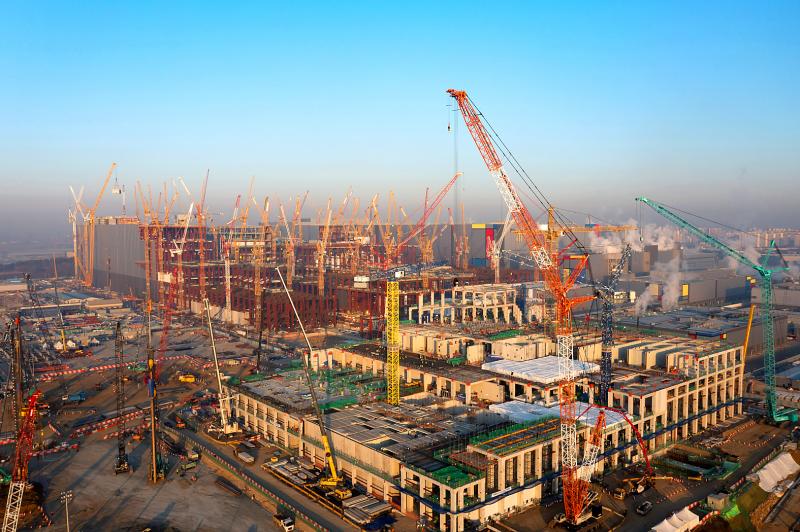For chip buyers ranging from computer gamers to automakers, there is no near-term fix on the way for shortages that have caused higher prices and production delays, semiconductor executives said.
Nvidia Corp, which makes chips that are the basis of graphics cards selling for thousands of US dollars more than their retail prices, sees some improvement in supply in the second half of the year, chief financial officer Colette Kress said on Wednesday at the JP Morgan Tech/Auto Forum.
Her comments led a string of presentations by other executives that similarly repeated their chip companies’ outlook for when supply and demand might reach some sort of balance. The bottom line is that most companies do not see any improvement before the middle of this year and many are saying not even then.

Photo: Bloomberg
Like other chipmakers that outsource their production, Nvidia has struggled to secure enough supply to meet demand. That bottleneck has hurt even the largest companies. Apple Inc, for example, has said it missed out on more than US$6 billion of revenue last quarter, because it could not get enough components.
For one of the companies that provides contract manufacturing, GlobalFoundries Inc, the surge in uses for chips coupled with the time it takes to increase capacity, means that this year would offer scant relief.
“It’s hard to imagine over the next two years a point where we don’t speak about supply issues,” GlobalFoundries CEO Tom Caulfield said during his appearance at the forum. “I don’t see any relief in 2022.”
Automakers have missed out on billions of US dollars in revenue, because they could not get the electronic components that are central to their products. Some of the industry’s chip suppliers stuck to a cautious outlook about when they would be able to fill orders more quickly.
ON Semiconductor Corp CEO Hassane El-Khoury told the online audience that demand would continue to outpace supply for the rest of this year. His company’s chips control the distribution of power in vehicles, particularly those running on electricity.
Analog Devices Inc, another major automotive chip supplier, was slightly more optimistic.
Growing orders would devour all of its supply until the fiscal third quarter, which ends in July, chief financial officer Prashanth Mahendra-Rajah said, adding that the company expects to significantly increase its supply output in the fourth quarter.
All the executives said that the demand is a fair reflection of the needs of their customers.
There is no sign of the kind of hoarding that might cause an inventory glut and later collapse in demand, they said.

South Korea’s equity benchmark yesterday crossed a new milestone just a month after surpassing the once-unthinkable 5,000 mark as surging global memory demand powers the country’s biggest chipmakers. The KOSPI advanced as much as 2.6 percent to a record 6,123, with Samsung Electronics Co and SK Hynix Inc each gaining more than 2 percent. With the benchmark now up 45 percent this year, South Korea’s stock market capitalization has also moved past France’s, following last month’s overtaking of Germany’s. Long overlooked by foreign funds, despite being undervalued, South Korean stocks have now emerged as clear winners in the global market. The so-called “artificial intelligence

NEW IDENTITY: Known for its software, India has expanded into hardware, with its semiconductor industry growing from US$38bn in 2023 to US$45bn to US$50bn India on Saturday inaugurated its first semiconductor assembly and test facility, a milestone in the government’s push to reduce dependence on foreign chipmakers and stake a claim in a sector dominated by China. Indian Prime Minister Narendra Modi opened US firm Micron Technology Inc’s semiconductor assembly, test and packaging unit in his home state of Gujarat, hailing the “dawn of a new era” for India’s technology ambitions. “When young Indians look back in the future, they will see this decade as the turning point in our tech future,” Modi told the event, which was broadcast on his YouTube channel. The plant would convert

‘SEISMIC SHIFT’: The researcher forecast there would be about 1.1 billion mobile shipments this year, down from 1.26 billion the prior year and erasing years of gains The global smartphone market is expected to contract 12.9 percent this year due to the unprecedented memorychip shortage, marking “a crisis like no other,” researcher International Data Corp (IDC) said. The new forecast, a dramatic revision down from earlier estimates, gives the latest accounting of the ongoing memory crunch that is affecting every corner of the electronics industry. The demand for advanced memory to power artificial intelligence (AI) tasks has drained global supply until well into next year and jeopardizes the business model of many smartphone makers. IDC forecast about 1.1 billion mobile shipments this year, down from 1.26 billion the prior

People stand in a Pokemon store in Tokyo on Thursday. One of the world highest-grossing franchises is celebrated its 30th anniversary yesterday.